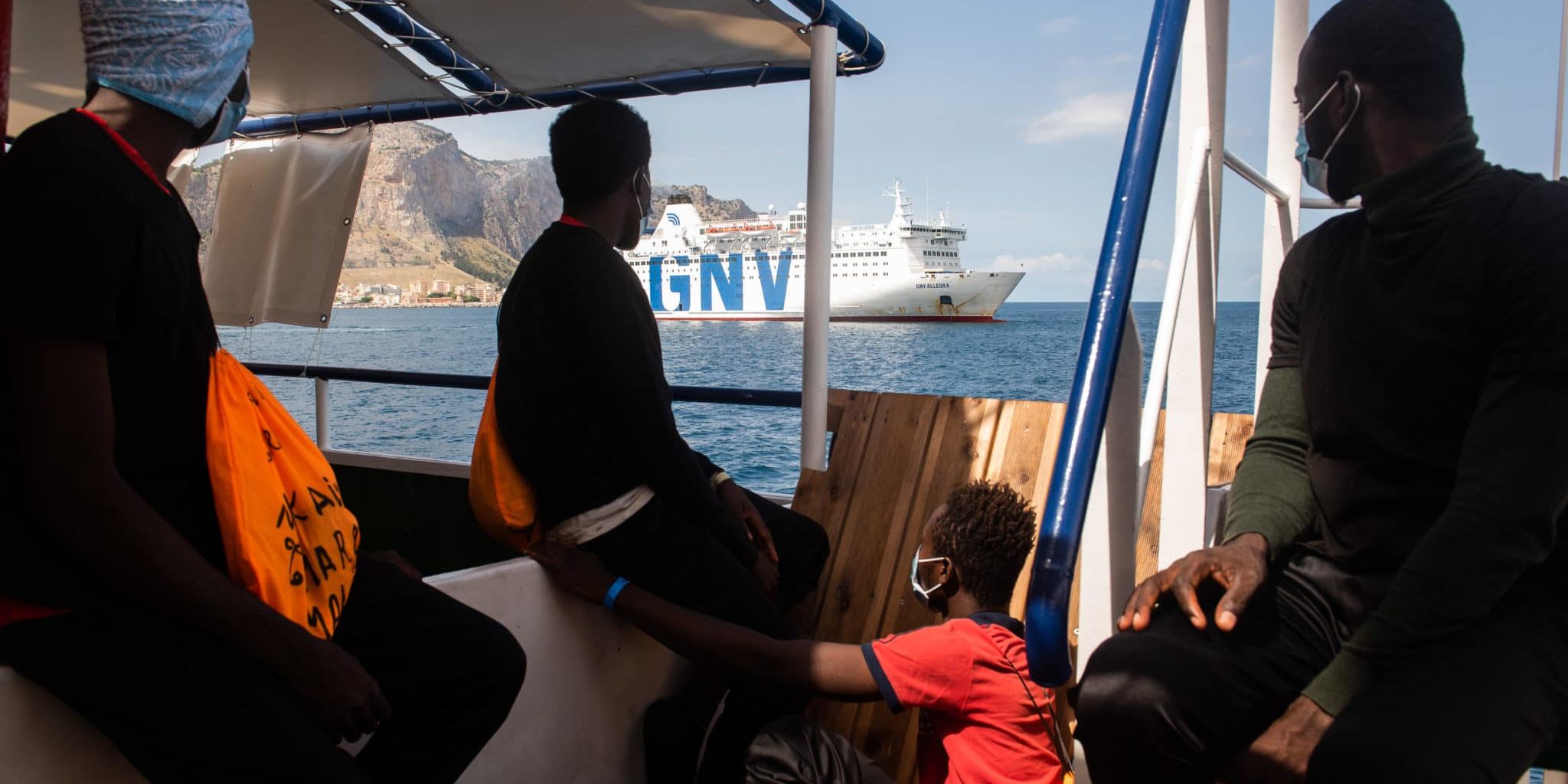Today, twelve days after the first conducted rescue of this mission, the Sea-Watch 4 was able to disembark 353 survivors in Palermo, Italy. European states continue to refuse to rescue shipwrecked people and instead instruct civilian actors to assist in rescues. Once in port, civil actors have to fear repression and the confiscation of their vessels for complying with the instructions from authorities and the dutiful rescue of people.
The Sea-Watch 4 rescued three boats from distress within 48 hours between 22 and 24 August, with a total of 202 people on board. After the medical evacuation of a teenager with severe fuel burns Wednesday last week, the remaining 201 rescued people on board the Sea-Watch 4 were waiting for assignment to a port of safety. The port of safety had already been requested on August 23 in Malta and Italy, the safe countries geographically closest to the rescue. Malta had rejected the Sea-Watch 4 request.
After the initially unanswered calls for help from the rescue vessel Louise Michel, which with 89 rescued people on board, had to assist another boat in distress with 112 people, Sea-Watch 4 changed course on Saturday, August 29, to help the by then unmaneuverable ship. Before the arrival of the Sea-Watch 4, an Italian Coast Guard vessel evacuated 49 women and families with children, left the scene, and later disembarked the people in Lampedusa without returning to further assist the Louise Michel. The captain of the Sea-Watch 4 was instructed by Maltese authorities to tranship people from the Louise Michel on the Sea-Watch 4. Being present at the scene with a Malta Armed Forces vessel, Malta made clear that they are not willing to take over this responsibility and left it to the Sea-Watch 4 to fulfill what is actually state duty.
Today, twelve days after the first conducted rescue, the Sea-Watch 4 was able to disembark 353 survivors in Palermo, Italy, where the rescued people were transferred to the quarantine ship GNV Allegra.
“We are happy and grateful that the ‘Sea-Watch 4 powered by United4Rescue’ is finally allowed to dock in Palermo. This is a great relief for all the people who have been waiting for a port of safety after their rescue onboard our alliance ship in the past days. Our thanks go to all those who made the rescue of over 350 people possible and carried it: All our allies and donors and the team of Sea-Watch and Doctors without Borders. They have done a great job in the past days. A task that actually has to be taken over by the EU member states. Europe can no longer stand idly by and watch people drowning at its borders”, says Michael Schwickart, board member of United4Rescue.
While in recent months thousands tried to escape Libya in boats unfit for sea, numerous active rescue ships, including the Sea-Watch 3, are systematically detained for alleged safety deficiencies or are prevented from being deployed by unfulfillable conditions.
“While the Sea-Watch 3 is still blocked in port as it is punished for rescuing too many lives out of distress, we once more stepped in where state actors shirk their responsibilities. It is unacceptable that civil sea rescuers first have to take over state tasks and then find themselves without a port of safety for days and days, having to worry about the confiscation of their rescue ships for saving lives. We are being punished for complying with the instructions by authorities and fulfilling the duty of rescue, where Europe ducks away. The EU must take responsibility for the self-made humanitarian disaster in the Mediterranean, at sea and on land”, says Philipp Hahn, Head of Mission on the Sea-Watch 4.
The EU states’ failure to assist in maritime emergencies, their refusal to take responsibility for their search and rescue regions, as well as their denial to provide a port of safety for days on end, is part of a policy of withdrawal that throws people in distress and rescuers back on their own. The case of the merchant ship Etienne, which rescued 27 people getting in distress inside the Maltese Search and Rescue Zone four weeks ago and which Malta continues to deny a port of safety, is meant to be read as a clear signal to commercial shipping: whoever fulfills the duty of rescue should not expect help and will be left alone.
Europe’s anti-immigration and blockade policy continues to be fatal: according to the International Organization for Migration (IOM), at least 45 people drowned in the central Mediterranean Sea in the week of departure of the Sea-Watch 4 alone, including five children. Local fishermen were the only ones who stepped in to save those who could still be saved. MSF teams spoke to survivors of the shipwreck who are back in Libya. They are distressed and suffer from first-degree burns. The organization AlarmPhone reports of further deaths.
The number of people who attempted to escape from Libya by sea in the first six months of 2020 increased four-fold in comparison to the same period last year. The majority of those who departed from the North African coast never made it. As Europe’s reckless approach to migration manifests in increasingly grotesque examples, there is a need to shine a light on the EU’s dangerous dereliction of duty in the central Mediterranean.











